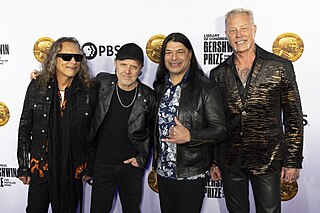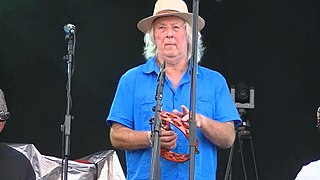
Metallica is an American heavy metal band. The band was formed in 1981 in Los Angeles by vocalist and guitarist James Hetfield and drummer Lars Ulrich, and has been based in San Francisco for most of its career. The band's fast tempos, instrumentals and aggressive musicianship made them one of the founding "big four" bands of thrash metal, alongside Megadeth, Anthrax and Slayer. Metallica's current lineup comprises founding members and primary songwriters Hetfield and Ulrich, longtime lead guitarist Kirk Hammett and bassist Robert Trujillo. Guitarist Dave Mustaine, who formed Megadeth after being fired from Metallica, and bassists Ron McGovney, Cliff Burton and Jason Newsted are former members of the band.

Jethro Tull are a British progressive rock band formed in Blackpool, Lancashire, in 1967. Initially playing blues rock and jazz fusion, the band soon incorporated elements of English folk music, hard rock and classical music, forging a signature progressive rock sound. The group's lead vocalist, bandleader, founder, principal composer and only constant member is Ian Anderson, who also plays flute and acoustic guitar. The group has featured a succession of musicians throughout the decades, including significant contributors such as guitarists Mick Abrahams and Martin Barre ; bassists Glenn Cornick, Jeffrey Hammond, John Glascock, Dave Pegg, Jonathan Noyce and David Goodier; drummers Clive Bunker, Barrie "Barriemore" Barlow and Doane Perry; and keyboardists John Evan, Dee Palmer, Peter-John Vettese, Andrew Giddings and John O'Hara.

...And Justice for All is the fourth studio album by American heavy metal band Metallica, released on August 25, 1988, by Elektra Records. It was the first Metallica album to feature bassist Jason Newsted, following the death of their previous bassist Cliff Burton in 1986. Burton received posthumous co-writing credit on "To Live Is to Die" as Newsted followed bass lines Burton had recorded prior to his death.
The Grammy Award for Best Rock Instrumental Performance was an honor presented to recording artists for quality instrumental rock performances at the Grammy Awards, a ceremony that was established in 1958 and originally called the Gramophone Awards. Honors in several categories are presented at the ceremony annually by the National Academy of Recording Arts and Sciences of the United States to "honor artistic achievement, technical proficiency and overall excellence in the recording industry, without regard to album sales or chart position".
The Grammy Award for Best Hard Rock Performance was an award presented to recording artists at the Grammy Awards from 1990 to 2011.
The 31st Annual Grammy Awards were held on February 22, 1989, at Shrine Auditorium, Los Angeles. They recognized accomplishments by musicians from the previous year.

The Grammy Award for Best Metal Performance is an award presented at the Grammy Awards to recording artists for works containing quality performances in the heavy metal music genre. The Grammy Awards is an annual ceremony, where honors in several categories are presented by The Recording Academy of the United States to "honor artistic achievement, technical proficiency and overall excellence in the recording industry, without regard to album sales or chart position". The ceremony was established in 1958 and originally called the Gramophone Awards.

Martin Lancelot Barre is an English guitarist best known for his longtime role as lead guitarist of British rock band Jethro Tull, with whom he recorded and toured from 1968 until the band's initial dissolution in 2011. Barre played on all of Jethro Tull's studio albums from their 1969 album Stand Up to their 2003 album The Jethro Tull Christmas Album. In the early 1990s he began a solo career, and he has recorded several albums as well as touring with his own live band.

Crest of a Knave is the sixteenth studio album by British rock band Jethro Tull, released in 1987. The album was recorded after a three-year hiatus caused by a throat infection of vocalist Ian Anderson, resulting in his changed singing style. Following the unsuccessful electronic rock album Under Wraps, Crest of a Knave had the band returning to a more hard rock sound. The album was their most successful since the 1970s and the band enjoyed a resurgence on radio broadcasts, appearances in MTV specials and the airing of music videos. It was also a critical success, winning the 1989 Grammy Award for Best Hard Rock/Metal Performance Vocal or Instrumental in what was widely viewed as an upset over the favorite, Metallica's ...And Justice for All. The album was supported by "The Not Quite the World, More the Here and There Tour".

Rock Island is the 17th studio album by the British rock group Jethro Tull, released in 1989. The album continued the hard rock direction the band took on the previous effort, Crest of a Knave (1987). The line-up now included Ian Anderson, Martin Barre, Dave Pegg and drummer Doane Perry in his first full recording with the band, although he had already been a member of Jethro Tull since 1984. Without a permanent keyboard player, the role was shared by Fairport Convention's Maartin Allcock and former Tull member Peter Vettese.

Gerald Conway was an English folk and rock drummer and percussionist. He performed with the backing band for Cat Stevens in the 1970s, with Jethro Tull during the 1980s, and was a member of Fairport Convention from 1998 to 2022. Conway also worked as a session musician. He was married to vocalist Jacqui McShee, the singer of the band Pentangle, of which he was also a member.

Doane Ethredge Perry is an American musician, composer and author. From 1984 to 2011 he was drummer and percussionist with the band Jethro Tull and has also appeared on hundreds of recordings spanning multiple genres on records, film and television.
This is a timeline documenting the events of heavy metal in the year 1989.

Ann Marie Calhoun is an American classically trained violinist who has performed as a bluegrass and rock musician in a number of prominent acts, including Jethro Tull, Steve Vai, Widespread Panic, Dave Matthews Band, Ringo Starr, A.R. Rahman and Mick Jagger's SuperHeavy. She has closely collaborated with Hans Zimmer on numerous film scores, including Sherlock Holmes, Interstellar, 12 Years a Slave, The Lone Ranger, The Little Prince, Man of Steel, and Captain Phillips. She is the sister of violinist Mary Simpson.
The Latin Grammy Award for Best Rock Solo Vocal Album was an honor presented annually at the Latin Grammy Awards, a ceremony conducted by the Latin Academy of Recording Arts & Sciences to "recognize excellence and create a wider awareness of the cultural diversity" and contributions of Latin recording artists in the United States and internationally. According to the category description guide for the 2009 Latin Grammy Awards, the award was given to vocal rock, hard rock or metal albums containing at least 51 percent of newly recorded material. It was given to a male or female artist.

The Grammy Award for Best Rock Performance is an award presented at the Grammy Awards, a ceremony that was established in 1958 and originally called the Gramophone Awards. According to the 54th Grammy Awards description guide it is designed for solo, duo/groups or collaborative rock recordings and is limited to singles or tracks only.












